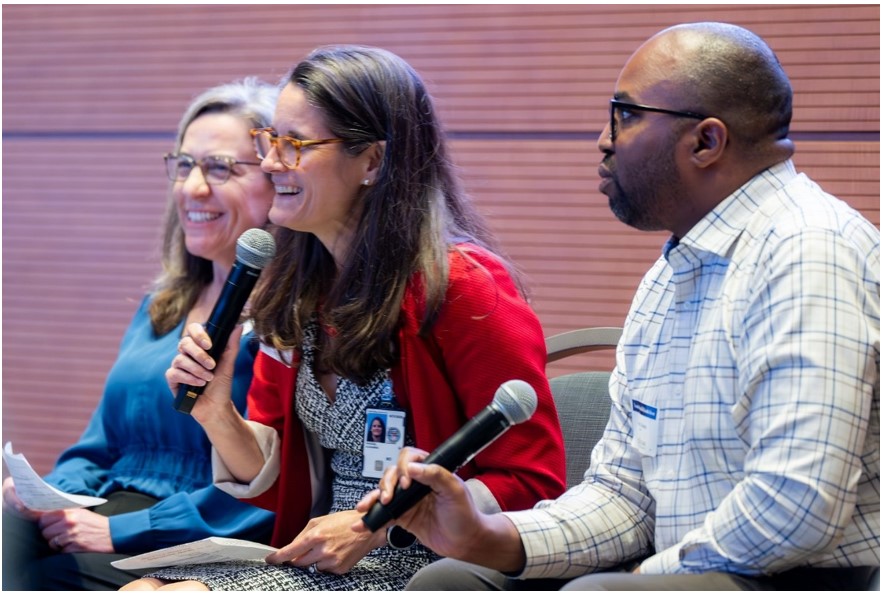
On September 19, 2024, the 20th Annual Duke CFAR Fall Scientific Retreat took place at the Trent Semans Center for Health Education. The event brought together nearly 200 researchers, clinicians, and community members to discuss recent advancements in HIV/AIDS research and spark ideas and collaboration. In an effort to foster an inclusive and engaging atmosphere, the day included a variety of presentation formats, and speakers were encouraged to use plain language to reach an interdisciplinary audience. We thank all who joined us and especially those who worked hard to plan and carry out a successful and inspiring retreat!
Please enjoy a recap of the retreat and photos by John Hansen/RTP.Studio. Recordings of the day are available on the CFAR website.

Kicking off the day with opening remarks, the attendees were warmly welcomed by director Georgia Tomaras and Dean Mary Klotman. The Dean highlighted the CFAR's growth and contributions over the years and the importance of community involvement and interdisciplinary collaboration, ending with a video of her recent conversation with Tony Facui. The Director's Welcome reflected on successes over the past year, including new grants and this year's pilot awardees.
"Nothing About Us Without Us"
The keynote discussion, "Nothing About Us Without Us," featured Junior Reid and Eugenia Rogers, representatives of the D3C, the CFAR's consultative group of community members. They provided personal insights into the evolving HIV epidemic, including lifechanging scientific advancements as well as areas still needing attention - including addressing stigma and access to affordable housing. They encouraged attendees to stay committed to the "heart work" of research and care, remembering communities most affected and working with compassion and openness.
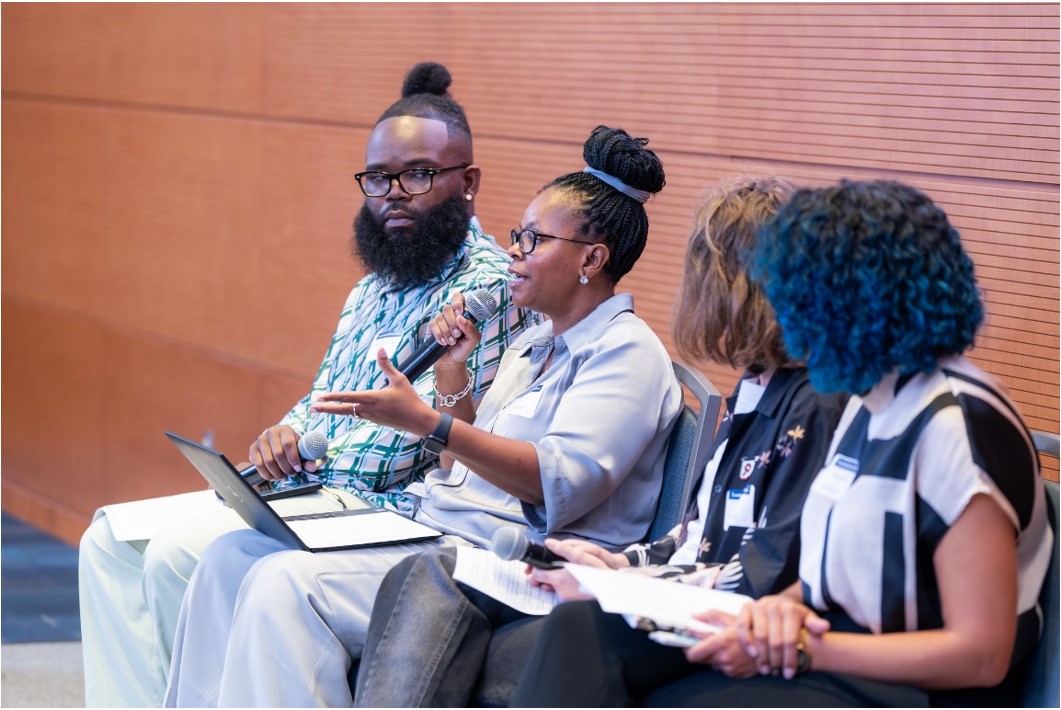
A room abuzz with science
This year's retreat saw a record 54 poster presenters, leading to a vibrant and engaging session on the 6th floor showcasing the breadth of research across the CFAR and the many contributions of trainees. In addition to their posters, presenters created infographics designed to communicate key takeaways of their research to the general public. Thank you to all presenters and our judges who reviewed the posters and awarded top posters in categories of Basic/Translational, Clinical, Quantitative, and Social and Behavioral Sciences.
Congratulations to the winners of this year's best poster awards!

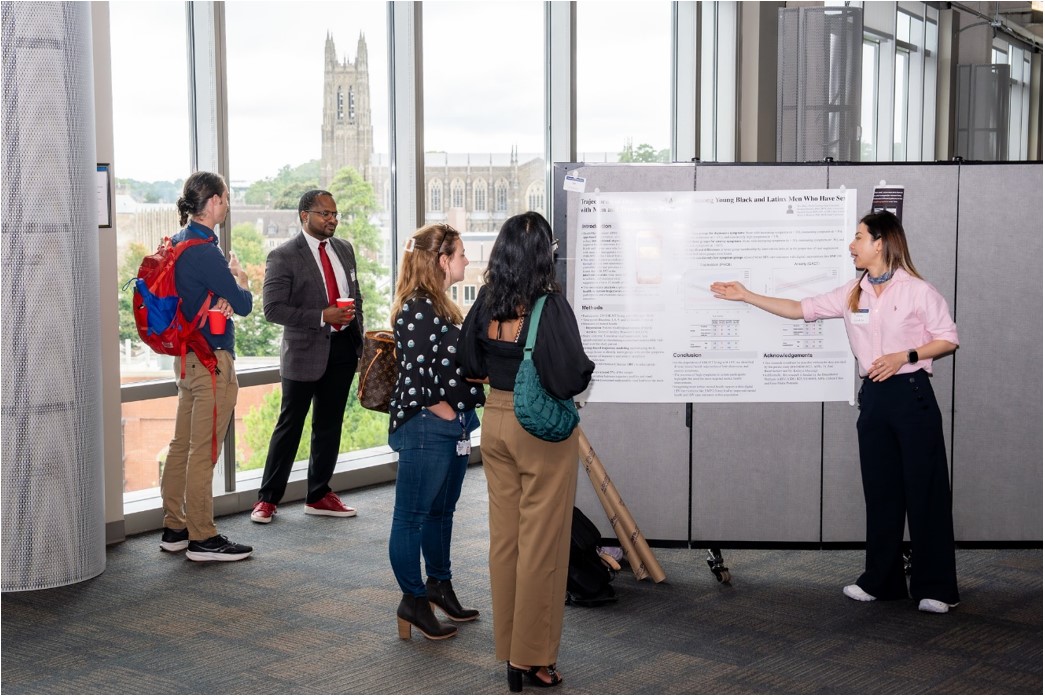
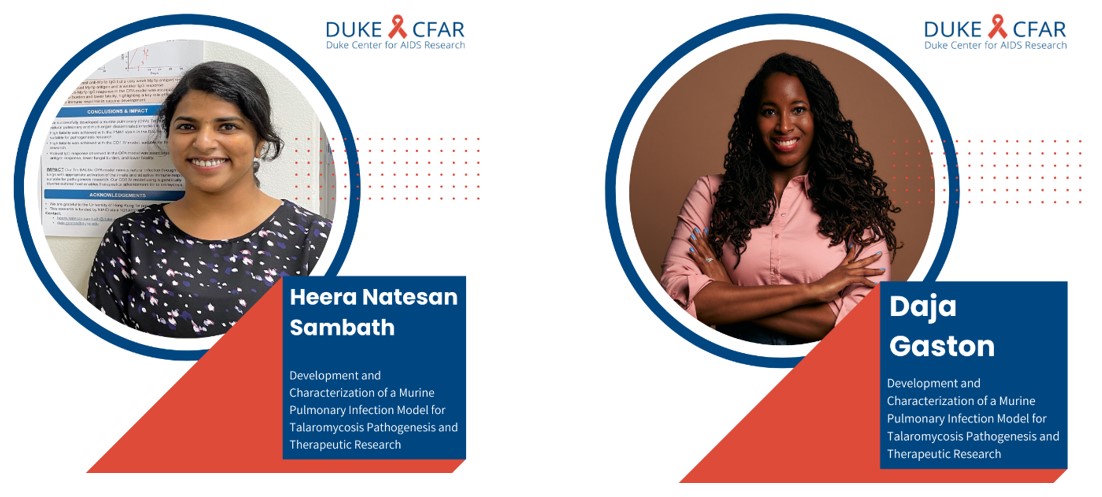
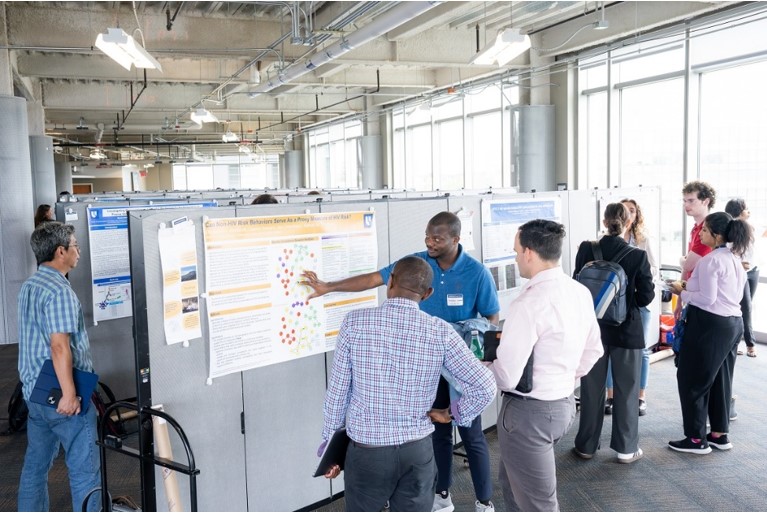
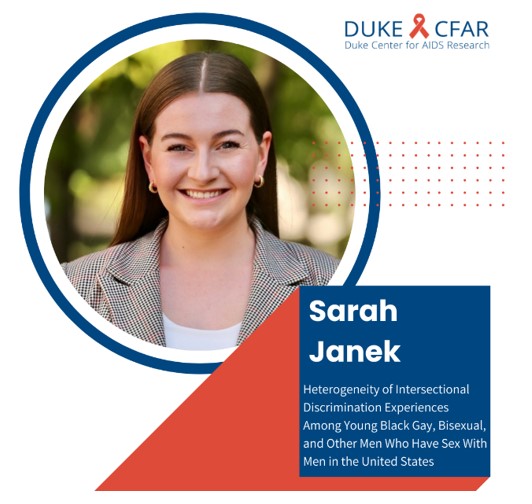
Charles Muiruri awarded 2024 Duke HIV/AIDS IRTPA T32 Outstanding Leadership in Scientific Mentoring Award
In partnership with the Duke School of Medicine and the Duke CFAR, the long-standing NIH T32 Duke Interdisciplinary Research Training Program in AIDS (IRTPA) acknowledges early career Duke faculty members who demonstrate leadership in the education and scientific mentoring of the next generation of scientists with a focus on interdisciplinary training and broadening participation in the biomedical workforce.
Program Co-Directors Nathan Thielman and Guido Ferrari presented this year's Outstanding Leadership in Scientific Mentoring Award to Charles Muiruri, Assistant Professor of Population Health Sciences and Assistant Research Professor, Duke Global Health Institute.
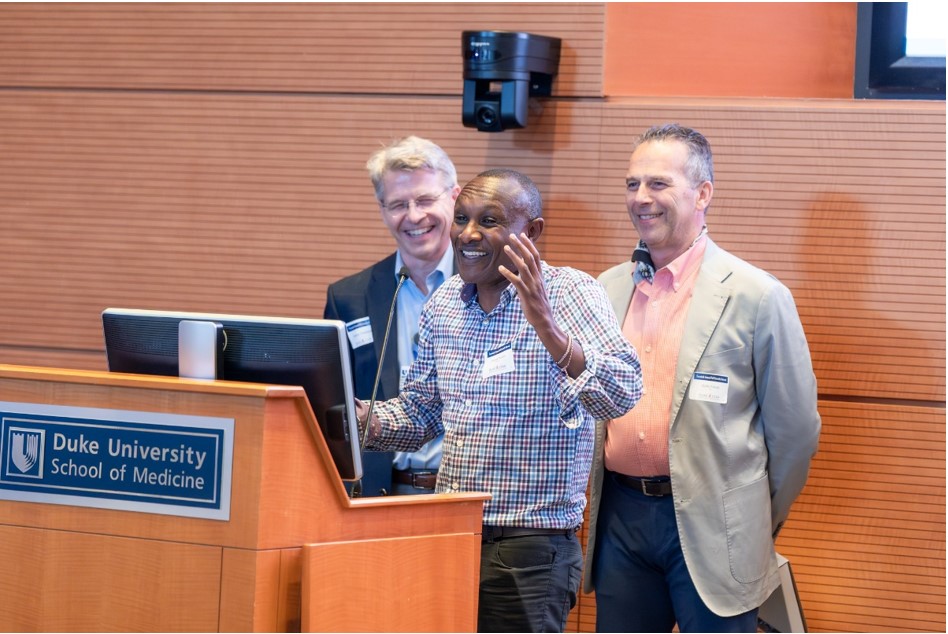
The IRTPA team shared several quotes from others as part of the nomination process which exemplify Dr. Muiruri's commitment to mentorship and support of trainees:
"Dr. Muiruri has been a superb mentor to both domestic and international trainees. He provides a wonderful balance of caring support and encouragement for each mentee to achieve his or her best performance."
"Dr. Muiruri is instrumental in supporting capacity building and mentorship to our institution. I have become a great mentor and outstanding local research leader through the inspiration from him and his mentorship and advice."
"Dr. Muiruri has shown an unwavering commitment to the development of graduate students, postdoctoral students, and junior faculty members. I have seen his passion for promoting careers in HIV research in action, and his detailed yet accessible approach to teaching and mentoring is frankly exemplary."
Congratulations, Dr. Muiruri!
What do bacteria, mRNA vaccines, and hair salons have in common?
Presenters illustrated the wide range of innovative research at the CFAR with their engaging talks, sharing insightful presentations on using bacteria to treat HIV (Neil Surana) and how HIV strains are evolving to become more antibody resistant (Kshitij Wagh).

In the afternoon, Schenita Randolph commanded the room with her reflections on community-engaged research and the collaboration between scientific research and everyday social spaces like hair salons. Wilton Williams shared his thoughts on leveraging mRNA technology for vaccine development and what lessons learned from COVID-19 vaccines can help us get to a successful HIV vaccine faster.

Speed Science: Big ideas in five minutes
The retreat debuted a "flash talk" format for oral presentations selected from submitted abstracts. Presenters had five minutes to discuss their key takeaways and outline of research. Congratulations to selected presenters!
- “Integrating HIV Prevention into Gender-Affirming Care” - Hayley Cunningham
- “Design and Evaluation of Stabilized HIV-1 Envelope Nanoparticles for Targeting V2-apex Broad Neutralizing Antibody Precursors ” - Séverin Coléon
- “Optimization of Antibody Expression using Machine Learning” - Minh Anh To
- “Heightened Awareness: Increased PrEP Uptake Among Indigenous Gay and Bisexual Men in Guatemala” - Catherine Purnell
- “Multicenter Prospective Clinical Validation of the Novel Mp1p Antigen Assay for Talaromycosis in Patients with Advanced HIV Disease in Vietnam” - Thu Nguyen
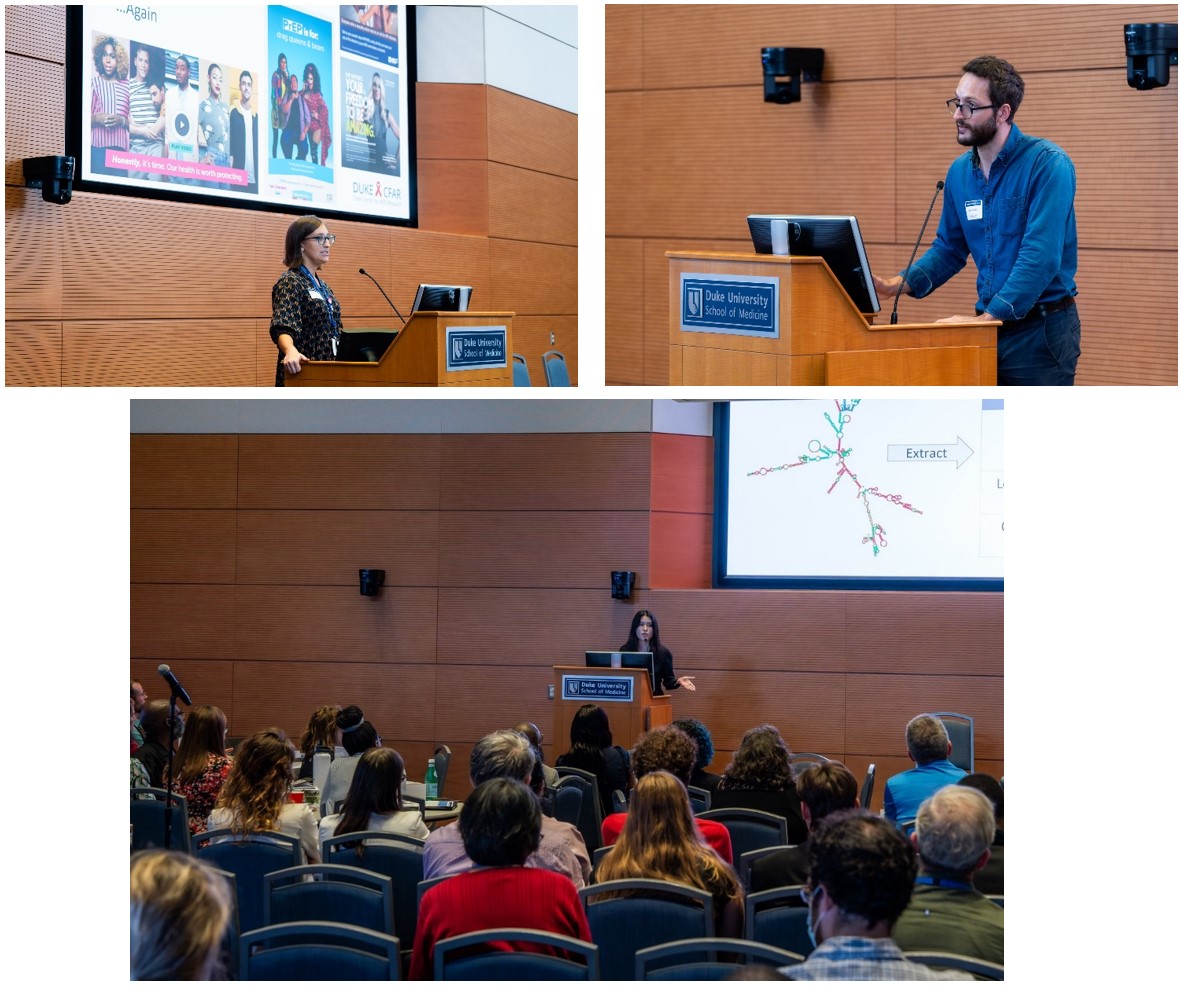

The power of collaboration: Creativity and community in action
Creativity, communication, and community were key themes rounding out the retreat. Attendees participated in an interactive exercise designed to deepen understanding and foster networking as CFAR members paired up with someone from another discipline to engage in conversation. Attendees were asked to reflect on prompts about their personal research path, connecting their work to the bigger picture, identifying opportunities for community engagement, and practicing communication to build trust and collaboration.

Guest keynote speaker Jonathan Livingston from North Carolina Central University concluded the day with an inspiring talk on innovative techniques for health education and promotion, sharing his team's successful theater collaborations and change-making plays and encouraging researchers to think outside the box and listen to community members.
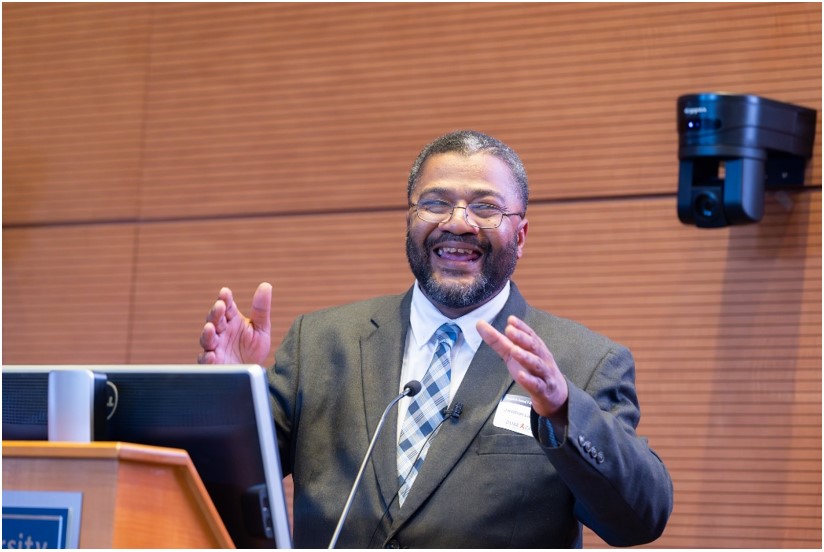
Reflecting on the day, CFAR leaders Georgia Tomaras, Susanna Naggie, and Lance Okeke shared their takeaways from the retreat and championed the importance of enhancing diverse perspectives. Stopping to appreciate the wide range of expertise in the room - particularly the content expertise brought by our community members - they shared their excitement for the bright and strong future of the Duke CFAR. New and innovative approaches were celebrated, particularly those that bring together experimental and computational work. The leadership emphasized the ongoing commitment to building partnerships rooted in humility and community, and echoed a resounding statement from the day: words matter. How we communicate as clinicians and scientists is crucial for effective collaboration and impactful research. We are grateful for the forum of communication that our annual retreat offers, and once again thank all for their contributions to an exciting and inspiring day!
